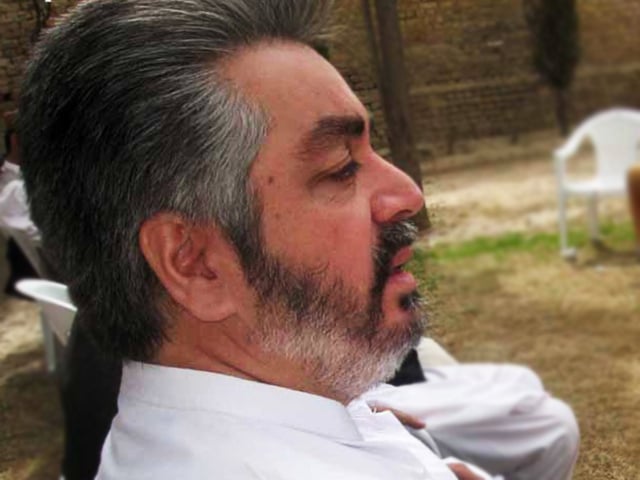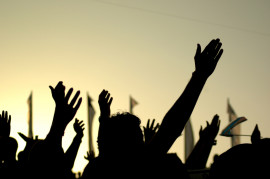
One of the critical issues that the next provincial set-up in Balochistan will have to face in the coming days is the appointment of an ethnic Pakhtun as governor, according to the central general secretary of Pakhtunkhwa Milli Awami Party (PkMAP) Akram Shah.
“Pakistan Muslim League-Nawaz, along with the National Party (NP) and PkMAP, which has emerged as the largest Pakhtun political party in May 11 elections, will have to address many critical issues including the fair division of political and administrative power amongst the two largest ethnic groups: Baloch and Pakhtuns,” Shah told The Express Tribune.
Constituting half the population of the province, Pakhtuns expect one of the top positions—either governor or chief minister– to be handed to a person representing their community, he said.
“We demand an equal share with Baloch people in all the political and administrative matters of the provincial government,” Shah said. Other ethnic groups should also be given their due share, according to him.

One of the strong contenders for the office of chief minister of Balochistan, Nawabzada Jangayz Marri from PML-N, admitted that all ethnic groups should be given a fair chance to represent the province. “PML-N will recognise the rights of Pakhtuns in power sharing,” Jangayz said, adding that other marginalised ethnic groups will also get justice.
The PML-N leadership seems to have struck off the name of its provincial party president Sardar Sanaullah Zehri’s from those vying for the post of chief minister. The move comes after reservations were expressed by the PkMAP and NP leaders during their recent meeting with Shahbaz Sharif in Quetta.
With Zehri out of the race, Jangayz Marri and Jan Muhammad Jamali are jockeying for support within the party to clinch the chief minister’s post. While Jan Jamali does not have the backing of his party’s top leadership, his close contacts with the establishment and civil bureaucracy may help him land one of two top offices in Balochistan.
NP president Dr Abdul Malik is another potential aspirant for the top slot of the province. He is backed by the PkMAP and his own party against the PML-N contenders.
Malik may enjoy a fair reputation of being highly credible but his chances to get a heads up from PML-N are bleak. Accepting a contender from a junior coalition partner party may cause unrest among the PML-N’s provincial legislatures. Another potential hurdle for Malik could be the fact that he is not a tribal chief.
PkMAP and NP might not be the only reasons that Zehri is out of the race for the provincial top slot. Sources reveal that being a bitter enemy of Sardar Akhtar Mengal, who is chief of his own faction of Balochistan National Party, Zehri’s appointment as chief minister could torpedo Nawaz Sharif’s efforts to bring Akhtar Mengal and other Baloch nationalist parties into the mainstream.
However, by installing Jangayz Marri, the elder son of Baloch separatist leader Nawab Khair Bakhsh Marri, as chief minister Nawaz Sharif could reach out to the Baloch militants including his two exiled younger brothers for peace talks.
Political observers say that Jangayz , with his influential family background, could prevail upon Baloch militants including his brothers and bring peace to the province. He could also be acceptable for Akhtar Mengal, whose exiled younger brother, Javed Mengal is leading a banned militant outfit known as Lashkar-e-Balochistan.
Published in The Express Tribune, May 22nd, 2013.
COMMENTS (10)
Comments are moderated and generally will be posted if they are on-topic and not abusive.
For more information, please see our Comments FAQ




































@Prince Baloch:
My brother, this narrow-mindedness will not take you anywhere.
If one wants a case study on how to create differences within a country, Balochistan would be prime example. Military has failed.
De-spit millions Afghan refugees, Pashtune population is not more than 20 percent in Balochitan,
Dear Luni Sahab... Talking of the next census ,to what extent are you sure enough about the exclusion of Afghan refugees? what would be the strategy of Pakhtun leaders in this context?If you find out the answer ,, perhapes the reaction of Baloch would be on the horizon..Dear I have a lot of respect for our Pakhtun brothers, but as far as the present scenario is concerned, Baloch is in the state of war and struggling for the survival. I hope that most of our friends understand the facts..
we should not think on ethnic lines. THERE IS NO DIFFERENCE BETWEEN BALUCHS PATHANS OR PUNJAB OR SINDHI. WE ARE MUSLIMS AND THINKING ON ETHNIC LINES IS NEITHER FAIR NOR ACCEPTIBLE TO ALLAH.
@Sarah: truely, defaming somebody is not correct.
The mortality rate in the southern Baloch regions of the province has always been higher than the northern Pakhtun areas of Balochistan. The reason for this different mortality rate is the reratively different climates--the south mostly flat deserts while the north, generally mountainous with much more clean water resources. Over the years this important fact was neglected by the Baloch leadership while the Pakhtun leaders were fully aware of it and waiting for the time that if a very transparent census takes place, Pakhtuns will be the predominant majority of the province. What would be reaction of the Balochs if in the next census Pakhtuns emerge as the majority ethnic group of the province.?
The topic is of importance and it is appreciable that light has been shed. The writer is seriously mistaken about Akhtar Mengal's brother. What the writer has written about him is completely wrong. Such unfounded content misinforms readers. How much research has the writer done or is he only spreading a propaganda of establishement or Rehman Malik to malign respectable figures like Akhtar Mengal and Javed? Or is it just hearsay?
Javed is a very peaceful and respectable person who does NOT support any armed struggle. Javed Mengal has served as an elected parliamentarian of the BNP-M and only supports democratic and peaceful struggle for Baloch rights and self-determination. Please avoid such unprofessional and irresponsible journalism. The writer should carefully verify before writing such baseless things. I anticipate that a well known newspaper like ET will be more responsible and not let itself be used as a propoganda tool by anyone and take the necessary action for such failures.
The topic is of importance and it is appreciable that light has been shed. The writer is seriously mistaken about Akhtar Mengal's brother. What the writer has written about him is completely wrong and it is very sad that Express Tribune has published such unfounded content that misinforms readers. How much research has the writer done or is he only spreading a propaganda of establishement or Rehman Malik to malign respectable figures like Akhtar Mengal and Javed? Or is it just hearsay?
Javed is a very peaceful and respectable person who does NOT support any armed struggle. Javed Mengal has served as an elected parliamentarian of the BNP-M and only supports democratic and peaceful struggle for Baloch rights and self-determination. Please avoid such unprofessional and irresponsible journalism. The writer should carefully verify before writing such baseless things. I anticipate that a well known newspaper like ET will be more responsible and not let itself be used as a propoganda tool by anyone and take the necessary action for such failures.
Its a Balochi name :Changaze, I don't understand why the ET and Dawn news are keep doing the same mistake